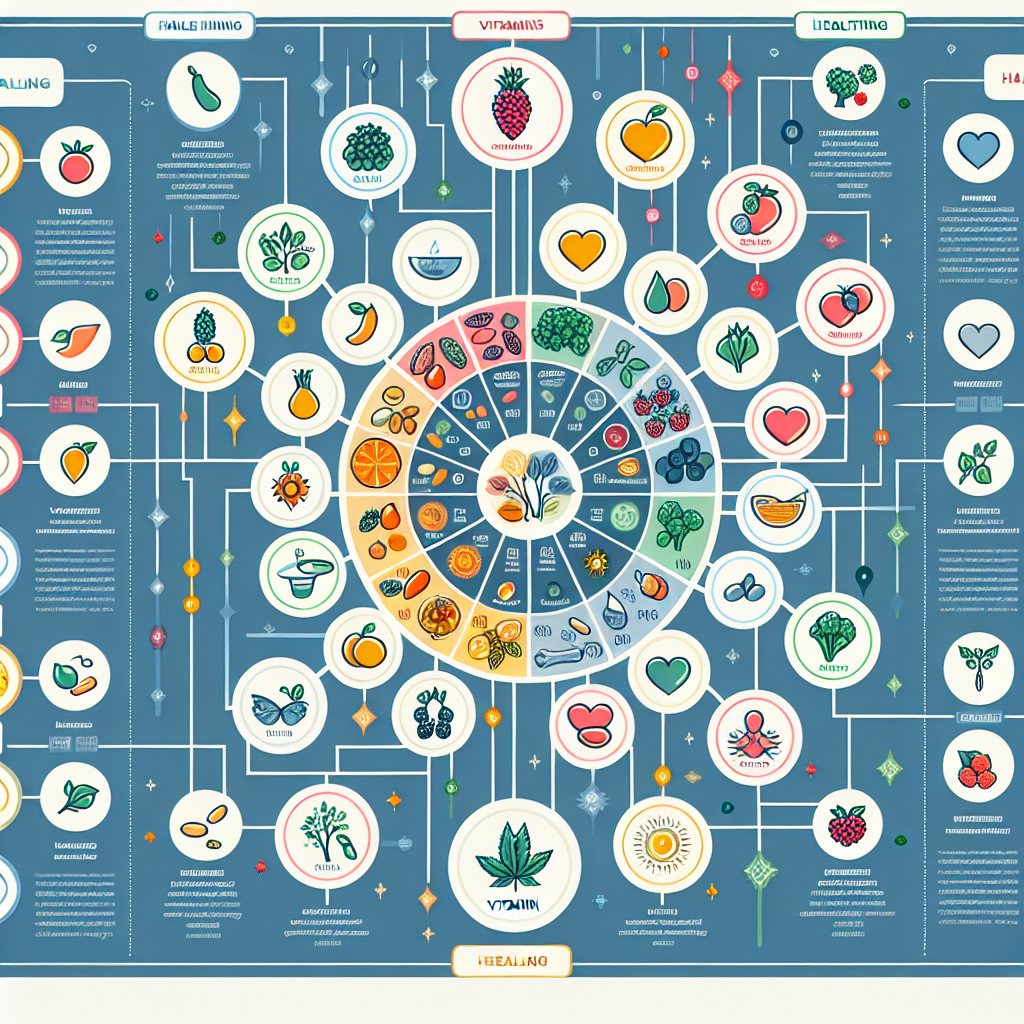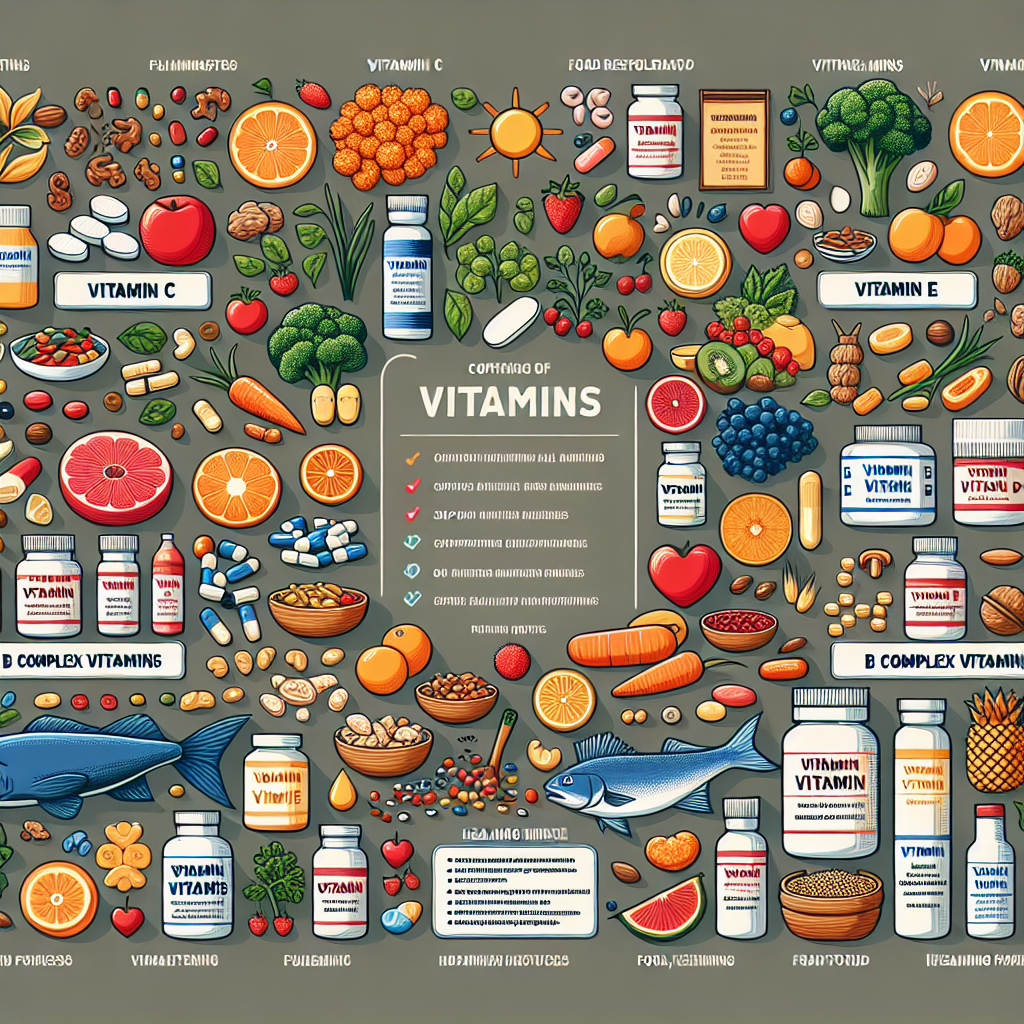Alternative Medicine: Which Vitamins Support Natural Healing?

Discover which vitamins support natural healing in the realm of alternative medicine. Learn more and enhance your health today. Click here.
Exploring the Role of Vitamins in Natural Healing Processes
Alternative medicine has been gaining traction in recent years as more and more people are seeking natural ways to support their health and wellbeing. One area of alternative medicine that has been particularly interesting is the role of vitamins in natural healing processes. Vitamins are essential nutrients that our bodies need to function properly and stay healthy. They play a crucial role in bodily functions such as metabolism, immunity, and digestion. But beyond these basic functions, certain vitamins have been found to support the body’s natural healing processes, making them an important part of alternative medicine.
Vitamin C, for instance, is well-known for its immune-boosting properties. It helps stimulate the production of white blood cells, which are crucial for fighting off infections. But beyond its role in immunity, Vitamin C also plays a key role in wound healing. It is necessary for the production of collagen, a protein that helps wounds heal by forming new skin tissue. This makes Vitamin C an essential nutrient for those recovering from surgery or injury.
Vitamin A, on the other hand, is often associated with good vision, but it also plays a significant role in cell growth and differentiation. This means it is crucial for the healing and growth of all tissues in the body, including skin and mucous membranes. Vitamin A also has anti-inflammatory properties, which can help reduce inflammation and speed up the healing process.
Vitamin E is another vitamin that is essential for natural healing. It is a powerful antioxidant that helps protect cells from damage. This is particularly important in the healing process, as damaged cells can slow down recovery. Vitamin E also supports the immune system, helping the body fight off infections that could potentially delay healing.
Vitamin D, often referred to as the “sunshine vitamin,” is also crucial for healing. It helps regulate the amount of calcium and phosphate in the body, which are needed for the growth and repair of bones. This makes Vitamin D particularly important for those recovering from bone fractures or surgeries.
Vitamin K is another essential nutrient for healing, particularly when it comes to blood clotting. When we get a cut or wound, our bodies need to form a blood clot to stop the bleeding. Vitamin K is necessary for this process, making it an important nutrient for wound healing.
While these vitamins play a crucial role in the body’s natural healing processes, it’s important to remember that they should not replace conventional medical treatments. Instead, they should be used as a complement to traditional medicine, providing additional support to the body during the healing process. It’s also important to note that while these vitamins can be obtained through a balanced diet, some people may need to take supplements to meet their nutritional needs. However, supplements should only be taken under the guidance of a healthcare professional, as excessive intake of certain vitamins can have adverse effects.
In conclusion, vitamins play a crucial role in the body’s natural healing processes, making them an important part of alternative medicine. By understanding the role of these vitamins, we can better support our bodies in their natural healing processes, promoting overall health and wellbeing.
The Power of Vitamins: A Deep Dive into Alternative Medicine

Alternative medicine has been gaining traction in recent years, with more and more people turning to natural remedies to support their health and wellbeing. One of the most popular forms of alternative medicine is the use of vitamins to support natural healing. This approach is based on the belief that the body has an innate ability to heal itself, and that by providing it with the right nutrients, we can enhance this natural healing process.
Vitamins are organic compounds that our bodies need in small amounts to function properly. They play a crucial role in various bodily functions, including metabolism, immunity, and cell growth. While we can get most of the vitamins we need from a balanced diet, some people may need to take supplements to meet their nutritional needs. This is particularly true for those with certain health conditions, dietary restrictions, or lifestyle factors that may limit their intake of certain nutrients.
One of the most well-known vitamins for supporting natural healing is vitamin C. This powerful antioxidant helps to protect our cells from damage and plays a key role in the production of collagen, a protein that helps to heal wounds and maintain the health of our skin, bones, and connective tissues. Vitamin C is also known for its immune-boosting properties, making it a popular choice for those looking to ward off colds and other illnesses.
Another vitamin that is often associated with natural healing is vitamin D. This nutrient is essential for bone health, as it helps our bodies to absorb calcium. But its benefits go beyond bone health. Research has shown that vitamin D can also support immune function, reduce inflammation, and even improve mood. This makes it a valuable tool for those looking to support their overall health and wellbeing.
Vitamin E is another antioxidant that can support natural healing. It helps to protect our cells from damage and supports immune function. It’s also known for its ability to support skin health, making it a popular choice for those looking to heal skin conditions or improve the appearance of their skin.
B vitamins, including B6, B9 (folic acid), and B12, are also important for natural healing. These vitamins support a range of bodily functions, including energy production, brain function, and red blood cell formation. They also play a key role in the body’s stress response, which can be particularly important for those dealing with chronic illness or stress-related health issues.
While vitamins can certainly support natural healing, it’s important to remember that they are not a cure-all. They should be used as part of a holistic approach to health that includes a balanced diet, regular exercise, adequate sleep, and stress management. It’s also important to consult with a healthcare provider before starting any new supplement regimen, as some vitamins can interact with medications or have side effects when taken in large amounts.
In conclusion, vitamins are a powerful tool in the world of alternative medicine. They offer a natural way to support our bodies’ innate healing processes and can be used to address a range of health issues. Whether you’re looking to boost your immune system, improve your skin health, or support your body’s stress response, there’s likely a vitamin that can help. Just remember to use them wisely and consult with a healthcare provider to ensure you’re meeting your nutritional needs in a safe and effective way.
Unveiling the Healing Potential of Vitamins in Alternative Medicine
Alternative medicine has been gaining traction in recent years, with more and more people turning to natural remedies to support their health and wellbeing. One area of alternative medicine that has been particularly popular is the use of vitamins to support natural healing. This approach is based on the idea that certain vitamins can help the body heal itself, reducing the need for pharmaceutical interventions.
Vitamins are organic compounds that our bodies need in small amounts to function properly. They play a crucial role in various bodily functions, including metabolism, immunity, and cell growth. While most vitamins can be obtained from a balanced diet, some people may need to take supplements to meet their nutritional needs.
Vitamin C is one of the most well-known vitamins for its role in supporting natural healing. It is a powerful antioxidant that helps protect the body against free radicals, which are harmful molecules that can damage cells and contribute to chronic diseases. Vitamin C also plays a key role in collagen synthesis, which is essential for wound healing. Moreover, it boosts the immune system, helping the body fight off infections and diseases.
Another vitamin that is often associated with natural healing is Vitamin D. This vitamin is unique because our bodies can produce it when our skin is exposed to sunlight. Vitamin D is crucial for bone health as it helps the body absorb calcium. Recent studies have also suggested that Vitamin D may play a role in wound healing and tissue repair. Furthermore, it has been linked to improved mood and mental health, which can indirectly support the healing process by reducing stress and anxiety.
Vitamin A is another essential nutrient that supports natural healing. It is vital for maintaining the health of our skin and mucous membranes, which are our body’s first line of defense against pathogens. Vitamin A also supports immune function and has antioxidant properties, which can help protect cells from damage.
Vitamin E is also worth mentioning for its role in natural healing. Like Vitamin C, it is a powerful antioxidant that helps protect cells from damage. Vitamin E also supports immune function and may help speed up the healing process of wounds and burns.
Lastly, the B vitamins, including B6, B9 (folic acid), and B12, are essential for various bodily functions that support healing. They help the body produce red blood cells, which are crucial for delivering oxygen to tissues and organs. They also support immune function and play a role in the synthesis of DNA and RNA, which is essential for cell growth and repair.
In conclusion, vitamins play a crucial role in supporting natural healing. They help protect our cells from damage, support immune function, and are involved in various bodily functions that are essential for healing. While most people can get enough vitamins from a balanced diet, some may need to take supplements to meet their nutritional needs. However, it’s important to remember that while vitamins can support healing, they are not a substitute for medical treatment. Always consult with a healthcare professional before starting any new supplement regimen.